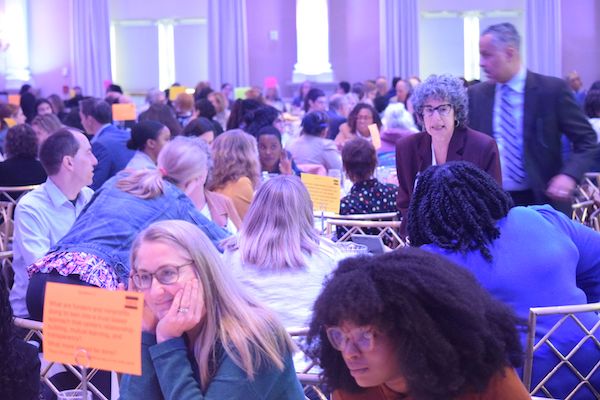Site Search
- resource provided by the Forum Network Knowledgebase.
Search Tip: Search with " " to find exact matches.
Capacity building enables nonprofit leaders and organizations to develop the skills and resources they need to improve their work. Since each situation is unique and circumstances are always changing, effective capacity-building support is tailored to best suit the needs of grantees. This publication offers practical guidance and considerations to help grantmakers design an impactful approach.
CNJG's 2018 Annual Meeting & Holiday Luncheon pre-meeting workshop with Michelle Greanias from PEAK Grantmaking focused on how foundation CEO’s, program officers, staff, and trustees could engage internally to put values-based grantmaking into practice.
Walk the Talk Video
This weekly conference call series welcomed New Jersey-based grantmakers along with national funders and provided an opportunity for grantmakers to hear from a wide range of experts in the field of disaster philanthropy. Series 1 started on November 5, 2012, one week after Sandy struck New Jersey, and continued through March 25, 2013. Series 2 started on September 9, 2013 and concluded on November 4, 2013. The written compendium of the recordings is listed below.
2025 CNJG Membership Renewal
Thank you for your membership investment with CNJG!
We continue using our contactless renewal process for the 2025 membership year. We no longer mail renewal notices. The “primary contact” for each member will receive the renewal notification by email in mid-October, 2024
“[CNJG has] done an amazing job of meeting people where they need to be in terms of providing additional resources and access to people in the know to help us navigate through very unchartered waters.”
-Margarethe Laurenzi, Maher Charitable Foundation
The dues investment for 2025 includes a Board-approved 3% increase. Members should base their 2025 dues on either:
1. Your 2024 giving or
2. An average of the past three years in giving (2022, 2023, 2024).
The chart of dues, based on your annual giving is below:
| Annual Giving Level | 2025 CNJG Dues |
| $ 0 to $ 100,000 | $ 770 |
| $ 100,001 to $ 250,000 | $ 925 |
| $ 250,001 to $ 500,000 | $ 1,440 |
| $ 500,001 to $ 750,000 | $ 1,850 |
| $ 750,001 to $ 1 million | $ 2,575 |
| $ 1 million to $ 2 million | $ 3,580 |
| $ 2 million to $ 3 million | $ 5,715 |
| $ 3 million to $ 5 million | $ 8,240 |
| $ 5 million to $7.5 million | $ 10,400 |
| $ 7.5 million to $10 million | $ 10,750 |
| $ 10 million to $15 million | $12,875 |
| $ 15 million to $20 million | $15,750 |
| $ 20 million to $30 million | $23,000 |
| $ 30 million to $50 million | $25,750 |
| $ 50 million to $75 million | $35,800 |
| $ 75 million and above | $41,700 |
The membership period begins January 1, 2024 and runs through December 31, 2025.
Some members choose to make all or a portion of their dues in the form of a grant. For tax purposes, all dues in excess of $770 may be reasonably reported as a grant.
Government Agency members and Associate members (CDFIs and Philanthropic Advisors) each have a different dues calculation. Government Agencies dues are a percentage of your administrative budget, and associate members are a flat rate for dues. Please click on the appropriate renewal button below to renew.
For additional criteria for dues calculations (ie. sun-setting foundations, those headquartered outside the state, and other special circumstances), please visit the Membership Policies section of our join page.
Renewal notices are due annually by March 31 with payments due by June 30. You can complete the renewal form today and wait to pay any time before June 30. If you need to pay after June 30, please note the alternate payment date on the renewal form. Please contact Craig Weinrich, Director of Member Services at 609-414-7110 x802 to make payment arrangements by check, EFT, or credit card (CNJG will add a 3% fee for memberships paid by credit card).
Leadership Gifts
“Engagement with other COVID funds throughout the state as we think about how to be most strategic have been really helpful to understand what others are doing and the implications of how we do our grantmaking activities.”
-Andy Fraizer, Community Foundation of South Jersey
Some members include an additional gift to help cover the costs of CNJG’s operations. Membership dues cover about 40% of our operations. These welcomed and unrestricted funds help underwrite the many programs and services that CNJG provides to our members and the philanthropic sector.
Please indicate your additional leadership gift on the renewal form when you complete it.
2025 Renewal Timeline
- Mid-October 2024 – CNJG membership renewal notices are emailed to the designated “primary” contact;
- March 31, 2025 – CNJG membership renewal commitments due (payment can be received later)
- June 30, 2025 – Dues should be paid by this date. Some members pay in the second half of the year, and CNJG appreciates knowing before then that you are renewing. Members that have not paid by this date, or indicated to CNJG that payment is forthcoming by this date, will be considered lapsed and removed as members.
- Mid-October, 2025 – Renewals for 2026 will be emailed.
2025 Member Renewal Process
- The link to our online renewal notice will be emailed to your designated “primary contact” in mid-October. In subsequent reminders, the invoices will be emailed to both the "primary contact" and the "billing contacts" at the organization. If you have not received any renewal notice, please let Craig know. You can complete the renewal notice here.
- Complete and return the renewal notice with either:
The amount of dues you are paying (based on your giving outlined above) and when CNJG can anticipate the payment.
or
Your pledge to pay at a later point in the year. Payment should be received by CNJG before June 30. Please contact Craig if an alternate payment date is needed. - Submit the renewal notice/invoice with payment or your pledge to renew by March 31.
- Update your contact information by having one of your “administrative contacts” update this information on the website. There are tutorials on our website about this process, or contact Craig with questions.
Looking Ahead to 2026
Our expectation is that for 2026, we’ll ask members to base their giving on your past three years average, or on your 2025 giving. We will also include the annual CNJG board-approved 3% increase in dues. CNJG has mapped out the dues rates for the next several years, so members can budget accordingly.
Thank you for being a part of the CNJG membership as we support and elevate New Jersey’s philanthropic community through shared learning, collaborative and trusting relationships, network building, and leadership.
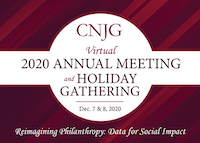
Please Log In to view resources from this event.
Reimagining Philanthropy: Data for Social Impact
Held:
Monday, December 7 - 2:00 to 3:30 pm -- Skill-Building Workshop
Tuesday, December 8 - 12:30 to 2:00 pm -- Business Meeting & Keynote Presentation
Thank you to everyone who attended CNJG’s first ever virtual Annual Meeting & Holiday Gathering. This year’s meeting focused on the many ways philanthropy can use data for social impact.
Data science is a powerful tool to address housing and food insecurity, education inequality, health disparities, civic injustice, and other longstanding social issues that continue to intensify during the pandemic. Building data capacity equips local leaders with information to develop and advocate for more effective policies. New evaluation strategies can outperform outdated processes that reinforce inequities and slow progress. Research and technology that fuels innovation in the private sector can help nonprofit and government organizations drive impact in New Jersey communities..
On Day 1, the Annual Meeting Workshop focused on evaluation and learning practices that center equity and social impact. And on Day 2, Keynote panelists shared how data science can help connect people to services, address racial inequity, and create greater impact in our communities during the pandemic and beyond..
Philanthropy can’t go back to “normal,” because normal wasn’t good enough. During this year’s Virtual 2020 Annual Meeting & Holiday Gathering we explored how we can reimagine philanthropy by harnessing the full power of data for social impact.
The Council of New Jersey Grantmakers would like to thank our sponsors for their generous support: Signature Sponsors – Novartis and PSEG; Sustaining Sponsors – Prudential and Horizon Blue Cross Blue Shield of New Jersey; Collaborating Sponsor – Robert Wood Johnson Foundation; and Performance Sponsor – The Provident Bank Foundation.
Philanthropic organizations of all shapes and sizes are well positioned to support Communities for a Lifetime (CfaL). This issue brief explores four roles for philanthropy in advancing CfaL work.
What would good foundation practice with solid evaluative inquiry at its core look like? Find out how your foundation can rethink the role of evaluation and turn it into a vital institutional tool.
This position is responsible for providing administrative and project support for the day-to-day operations for the Corporate Social Responsibility Department comprised of The Foundation, Community Affairs and Employee Engagement activities, its meetings, events, data and budget management, and all processes and business operations.
Provident Bank has awarded $475,000 in funding to five nonprofit organizations as part of the New Jersey Department of Community Affairs’ Neighborhood Revitalization Tax Credit Program for Fiscal Year 2022.
The nonprofit organizations will use the funding to implement revitalization plans that address housing and economic development, provide opportunities for entrepreneurs to start businesses and job training for local residents, as well as complementary activities such as social services, recreation activities and open space improvements.
The New Jersey Department of Community Affairs served as the intermediary agency between the nonprofit organizations and Provident Bank.
Food is essential. But how often do you consider where your food comes from?This issue of What Funders Need to Know from the Washington Regional Association of Grantmakers explores the stages of the food system, from production all the way to disposal. Why is this important to philanthropy?
Because hunger, food insecurity, nutrition-related chronic disease, the health of resource lands and waterways, wages, and equal opportunity in the food economy all converge in our regional food system.
Native Voices Rising is a joint research and re-granting project of Native Americans in Philanthropy and Common Counsel Foundation. This report focuses on the practices and challenges of community organizing and advocacy, focusing on the need for increased investment in and sustained support for American Indian, Alaska Native and Native Hawaiian communities.

Retributing Power by Simplifying and Streamlining Processes
Sisters of St. Joseph Health & Wellness Foundation
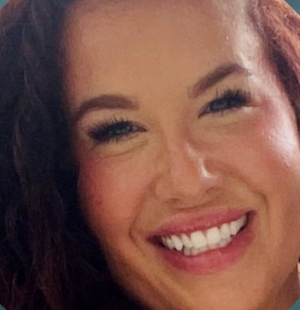 When Beth Collins joined the Sisters of St. Joseph Health and Wellness Foundation as the new Executive Director, she knew that the foundation could be doing more to support its nonprofit ecosystem. With a background in direct service, Beth remembered when she was on the other side of the funding relationship – sometimes spending hours writing lengthy application materials or digging up data to meet reporting requirements, all while juggling her never-ending to-do list. By aligning the values of Trust-Based Philanthropy to the virtues and mission of the Sisters of St. Joseph, she has catalyzed a shift toward redistributing power in its community partnerships.
When Beth Collins joined the Sisters of St. Joseph Health and Wellness Foundation as the new Executive Director, she knew that the foundation could be doing more to support its nonprofit ecosystem. With a background in direct service, Beth remembered when she was on the other side of the funding relationship – sometimes spending hours writing lengthy application materials or digging up data to meet reporting requirements, all while juggling her never-ending to-do list. By aligning the values of Trust-Based Philanthropy to the virtues and mission of the Sisters of St. Joseph, she has catalyzed a shift toward redistributing power in its community partnerships.
This power shift began when Beth started a conversation about values with the foundation board. By approaching the board with curiosity and bringing the voice of the community into the conversation, she set the tone for trust, openness, and an ongoing dialogue. The Foundation is now working toward fully embodying its values in its practices. The Sisters of St. Joseph have expanded their general operating support portfolio, shifted the bulk of the application process from applicants to the Foundation, replaced written reports with honest conversations, and created more opportunities for the public to provide feedback and engage in candid dialogue with the board. Focusing on only the essential information for applications and reporting has enabled staff to redirect their time and energy to develop wholehearted relationships with community partners. By starting with the why, Beth is leading the Foundation toward a clear vision for the how: “Trust Based Philanthropy is about humility – at Sisters of St. Joseph, we recognize that we are just one piece of the puzzle – and we are encouraging others to think outside of themselves.”
Offering Support Beyond the Check
Liberty Hill Foundation
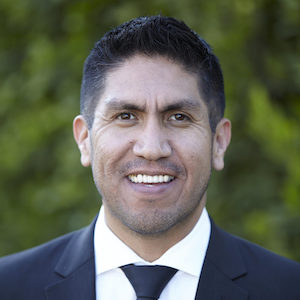 A community-funded foundation since day 1, Trust Based Philanthropy is at the core of the Liberty Hill Foundation. Centered on social justice campaigns, research, and policy initiatives designed to drive systemic change, Liberty Hill Foundation refers to itself as a "Laboratory for Social Change Philanthropy”. When Julio Marcial stepped into the role of Senior Vice President of Programs, he looked beyond the funding and considered the myriad of ways the foundation can support community partners beyond the check by connecting them to other funders and donors. As a member of several pooled funds in Los Angeles, Liberty Hill Foundation proactively seeks opportunities that will benefit their community partners. The Foundation has introduced many funders in their circle to Trust Based Philanthropy principles – this has sparked several conversations at other foundations serving Los Angeles county, several of which have since shifted their practices. Beyond private and public foundations, Marcial advocates for a push to Trust Based Philanthropy in California state funding agencies.
A community-funded foundation since day 1, Trust Based Philanthropy is at the core of the Liberty Hill Foundation. Centered on social justice campaigns, research, and policy initiatives designed to drive systemic change, Liberty Hill Foundation refers to itself as a "Laboratory for Social Change Philanthropy”. When Julio Marcial stepped into the role of Senior Vice President of Programs, he looked beyond the funding and considered the myriad of ways the foundation can support community partners beyond the check by connecting them to other funders and donors. As a member of several pooled funds in Los Angeles, Liberty Hill Foundation proactively seeks opportunities that will benefit their community partners. The Foundation has introduced many funders in their circle to Trust Based Philanthropy principles – this has sparked several conversations at other foundations serving Los Angeles county, several of which have since shifted their practices. Beyond private and public foundations, Marcial advocates for a push to Trust Based Philanthropy in California state funding agencies.
The Liberty Hill Foundation embraces itself as a fundraiser for its nonprofit partners and its responsibility for the Los Angeles community. The Foundation raises the funds and opens doors for nonprofits and then “steps out of the way,” says Julio. According to Julio, partnerships are the key to maximizing trust and impact in the community: “We can't do this without our partners, peers, and donors. We need to call each other out – and to call each other in.”
Leading with Trust, Transparency, and Responsiveness
Headwaters Foundation
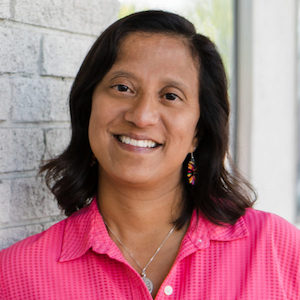 Headwaters Foundation is a health-conversion foundation working side by side with the community to achieve better outcomes towards a healthy and thriving Western Montana. Brenda Solorzano, CEO of Headwaters, has been at the helm of the foundation since its inception in 2017. With over 20 years of experience in traditional philanthropy, Brenda began asking big questions about standard philanthropic practices. Brenda is especially focused on tapping into the collective knowledge and experience of the community to create impactful systems. Early on in her tenure as CEO, Brenda shared her vision for Trust Based Philanthropy with the foundation’s board and they have supported her as she’s stewarded the foundation through its strategic planning process.
Headwaters Foundation is a health-conversion foundation working side by side with the community to achieve better outcomes towards a healthy and thriving Western Montana. Brenda Solorzano, CEO of Headwaters, has been at the helm of the foundation since its inception in 2017. With over 20 years of experience in traditional philanthropy, Brenda began asking big questions about standard philanthropic practices. Brenda is especially focused on tapping into the collective knowledge and experience of the community to create impactful systems. Early on in her tenure as CEO, Brenda shared her vision for Trust Based Philanthropy with the foundation’s board and they have supported her as she’s stewarded the foundation through its strategic planning process.
Community input and feedback was important to Brenda. With the board’s support, she took this a step further by engaging the community as co-creators and decision-makers. To accomplish this, Brenda invited 600 nonprofit representatives across the state to the table to share their thoughts. Brenda asked each person 2 questions: “If you were in my seat, what do you think the foundation should prioritize?” and “What’s the biggest challenge in your work?” By creating a space for open dialogue, Brenda took the pulse of the real challenges in Western Montana communities.
Soon after her introduction to Western Montana’s nonprofit sector, Brenda called on the community again to help design the foundation’s strategic focus. She hosted a series of public community meetings in each of Montana’s 15 counties. Headwaters facilitated a design-thinking process for members to discuss their challenges and co-create solutions. Two key strategies emerged: upstream systems and social change determinants prioritizing children and Indigenous populations.
Brenda engaged the community as decision-makers as Headwaters explored partner organizations for the foundation’s child thriving portfolio. The community nominated and voted on non-profit partners in a live meeting. This was a new approach and even some staff were nervous about the outcome. Headwaters proudly reports that a few years later, many of the organizations selected have grown to become blossoming collaborations. Grounded in Trust-Based principles since its inception, Headwaters is an exemplar of what it means to Do Good Better. Brenda says, “Trust Based Philanthropy is about starting from a place of trust.”
Co-Creating Goals by Soliciting and Acting on Feedback
T. Rowe Price Foundation
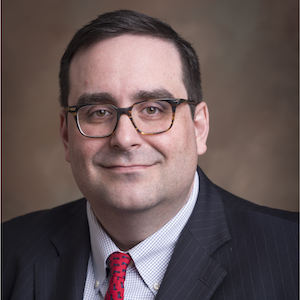 When John Brothers joined T. Rowe Price Foundation as President in 2015, the Foundation’s home in Baltimore was in the midst of social unrest following the tragic murder of Freddie Gray, a 25-year old Black man arrested over his legal possession of a knife and sustained injuries while being transported by the Baltimore Police. The T. Rowe Price Foundation recognized that it was a critical time to pause and listen to the Baltimore community. Within months of joining the Foundation, John Brothers and the Foundation team began an ongoing dialogue within Baltimore – in homes, places of worship, and community spaces. By leaning into the expertise and experience of community partners, John developed the T. Rowe Price’s Theory of Philanthropy, which mirrors principles to those similar to Trust-Based Philanthropy.
When John Brothers joined T. Rowe Price Foundation as President in 2015, the Foundation’s home in Baltimore was in the midst of social unrest following the tragic murder of Freddie Gray, a 25-year old Black man arrested over his legal possession of a knife and sustained injuries while being transported by the Baltimore Police. The T. Rowe Price Foundation recognized that it was a critical time to pause and listen to the Baltimore community. Within months of joining the Foundation, John Brothers and the Foundation team began an ongoing dialogue within Baltimore – in homes, places of worship, and community spaces. By leaning into the expertise and experience of community partners, John developed the T. Rowe Price’s Theory of Philanthropy, which mirrors principles to those similar to Trust-Based Philanthropy.
T. Rowe Price’s Theory of Philanthropy centers long-term impact by strategic investments in areas identified in partnership by those who live and work within the Baltimore community. The Foundation and community partners co-define a vision for success and community partners are trusted with the agency to make decisions in pursuit of shared goals. T. Rowe Price’s Theory of Philanthropy is considered a distinct model among other large corporate foundations. When asked how John managed to gain board consensus on this novel approach, he characterized the Theory of Philanthropy with a business metaphor: “People don’t buy stocks for an iPhone – they invest in Apple.” The Foundation focuses on supporting nonprofit organizations in a holistic way. By listening to the community early on, John shifted the Foundation’s approach from funding a variety of important, yet disconnected, programs to a co-creating strategic investment of capital and other support on more focused efforts that will have a lasting impact. To learn more please visit troweprice.com/foundation.
Doing Good Better, a partnership of the Council of New Jersey Grantmakers and the New Jersey Center for Nonprofits, is a community of funders and nonprofits taking action against the power imbalances and racial inequities in philanthropy, nonprofits, and government.
In this arts briefing, Nadia Elokdah, Vice President and Program Director for Grantmakers in the Arts, will discuss the unique opportunity for arts grantmakers to support advocacy and influence policy through their funding decisions and why the arts should be included in decision-making processes. She will also cover the importance of arts funding in building narrative power and driving cultural change. Vanessa Ramalho, Director of External Relations of ArtPride New Jersey, will highlight the challenges faced by arts and cultural organizations in New Jersey and their intersections with community issues relating to the ongoing changes in federal policy. She will also share how ArtPride New Jersey is leveraging its statewide reach to develop collaborative advocacy strategies to influence and help shape policies informed by the needs and voices of the arts sector and the communities they serve. Vanessa will explore ways that funders might shift their focus and priorities to better meet the needs of organizations that are navigating increasing financial uncertainty as a result of federal policy changes.
Nadia Elokdah is an urbanist and design strategist with more than a decade working at the intersection of public systems and cultural practice. She currently serves as Vice President & Director of Programs at GIA. Most recently she served as special projects manager with the New York City Department of Cultural Affairs coordinating the City’s monuments commission. Prior, she served as coordinator in the development of the City’s first cultural plan, CreateNYC, in which she coordinated and led hundreds of engagements with a broad cross-section of the public, as well collaborating in the writing and production of the plan. She is devoted to civic engagement through culturally responsible, inclusive, and equitable design practice, exemplified in collaborations with the International Design Clinic, in.site collaborative, and Monuments Lab. Nadia is a trained architect and designer, researcher, professor, and published author, including Identity Crisis, a cultural exploration of urban planning through the hammam. She currently serves as steering committee member of the Women of Color in the Arts (WOCA) Non-Black POC Solidarity! into Action Committee, National Coalition for Arts Preparedness & Emergency Response (NCAPER) Programming Working Group, and an advisory board member for Unsettled.
Vanessa Ramalho, Director of External Relations, supports ArtPride’s advocacy and government affairs work, leading efforts to move forward legislative priorities that support the sustainability of the arts in New Jersey. Vanessa also builds relationships with constituents throughout the state — from community members to arts organizations, and local and state representatives — to support the cultivation of a thriving arts ecosystem. With nearly 20 years of experience in the nonprofit arts & cultural sector, Vanessa has led community education, fundraising, and grassroots advocacy projects across a range of organizations, including the Sadie Nash Leadership Project, the Asian Pacific Islander Coalition on HIV/AIDS (APICHA), Project KISS of New York Presbyterian Hospital, The Princeton Ballet School, the Asian Arts Initiative, and the Center for Babaylan Studies.
Cost: Free for CNJG Members; $75 for Non Member Grantmakers
This program is only open to staff and trustees from grantmaking organizations.
Programs in this Series:
March 13: Making Sense of Federal Policy: Understanding What it Means for NJ: Immigration
March 20: Making Sense of Federal Policy: Understanding What it Means for NJ: Health
March 27: Making Sense of Federal Policy: Understanding What it Means for NJ: Environment
April 3: Making Sense of Federal Policy: Understanding What it Means for NJ: Education
April 10: Making Sense of Federal Policy: Understanding What it Means for NJ: Housing
April 17: Making Sense of Federal Policy: Understanding What it Means for NJ: Media & Journalism
April 24: Making Sense of Federal Policy: Understanding What it Means for NJ: Arts
Webinar Video




